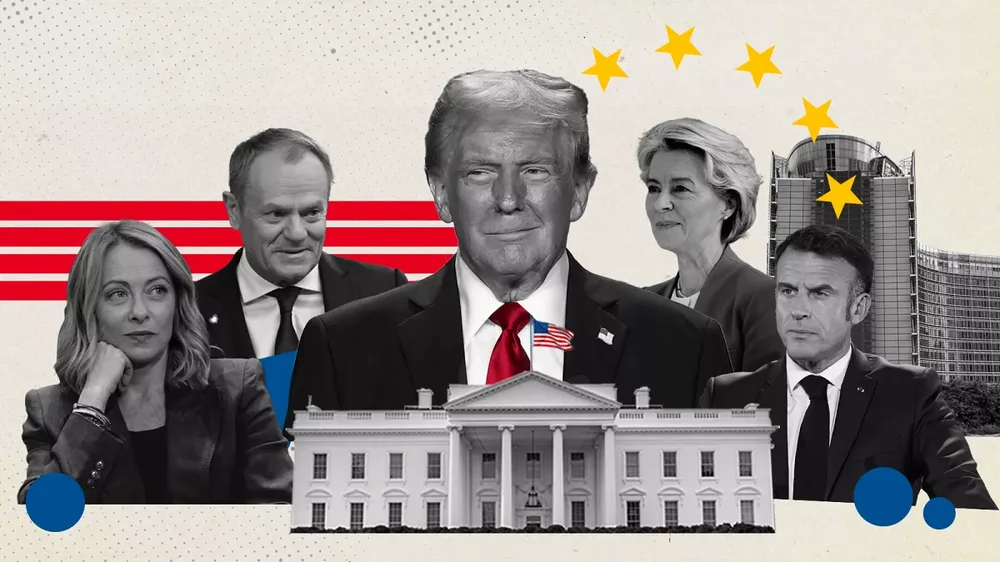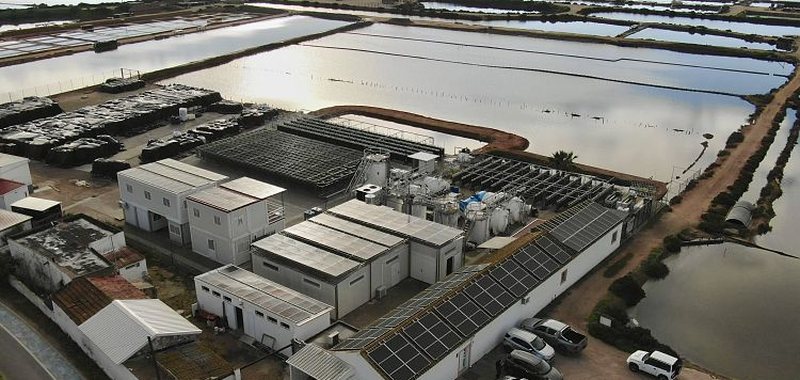Trump "unites" Europe - How can the EU benefit from US policies?

A new strategic report predicts that US President Donald Trump's policies are exactly the medicine the European Union needs to become a single market and boost growth.
Although Europe cannot avoid a recession, coordinated fiscal support, possible monetary policy easing by the European Central Bank (ECB) and a renewed push for integration "will soften the blow and boost long-term growth," according to a report by investment research firm BCA.
“Ironically, Trump is doing more to advance European unity than anyone since Schumann, Monnet and Adenauer,” one of the authors noted. Despite the temporary 90-day pause in the 20% tariffs hitting EU goods exports to the US, the BCA said a recession is certainly a real possibility.
The eurozone economy is plagued by uncertainty, weakening business confidence and deteriorating capital spending, the report said. These challenges come at a time when the region is already struggling, with GDP growing by 0.1% in the last three months of 2024. Tariffs and uncertainty are expected to push the fragile economy into contraction for at least two consecutive quarters by mid-2025.
The European Commission estimated that tariffs could wipe out 0.2% of eurozone GDP by 2027. In a more severe scenario, if tariffs are permanent or if there are sustained countermeasures, the figure reaches 0.5%-0.6% in three years.
What do the US and the EU offer in the negotiations?
The EU-US talks are set to take full effect in the third quarter of 2025, as Trump aims to conclude talks with Canada and Mexico first. The negotiations will not be easy, as most of the topics on the table relate to non-tariff barriers. Many of them relate to internal EU rules, including the bloc's data privacy regulation and the Common Agricultural Policy.
What is potentially helping the EU's negotiating position is that the US is exporting far more services to the EU than vice versa. Total bilateral trade in this sector was worth €746 billion in 2023, according to the European Commission.
One measure that could help the EU reach a deal is buying more energy from the United States. Trump wants to increase energy production, while Europe is seeking affordable imports of liquefied natural gas, while it is building a giant LNG regasification facility on its northern coast.
Boosting the lagging European economy
Washington’s latest tariff move has brought trade uncertainty and, as a result, the EU economy is experiencing a decline in business sentiment, falling corporate profits and a decline in capital spending and European investment rates. All of these are signs of an approaching recession. An important short-term step is fiscal support from countries like Germany, where the government’s stimulus package promises an additional 1% growth per year over the next 2 years.
Another move to boost the eurozone economy could be a cut in the deposit rate to below 2% by the European Central Bank. In addition, the report said the ECB could restart its quantitative easing program, a tool that allows it to buy bonds from commercial banks, pumping additional liquidity into the European economy and boosting investment. Further EU policy measures are expected to include diversifying trade away from the US, improving relations with India, Canada, Latin America and the United Kingdom.
The European Union's economy is still highly fragmented, and regulatory differences often act as non-tariff barriers between member states, a long-term obstacle to Europe's competitiveness and prosperity. Eliminating them could give the bloc's economy a boost. According to the IMF, non-tariff barriers within the EU are equivalent to a 44% tariff on goods and a 110% tariff on services.
"It's as if there were a 44% tariff between Germany and Italy, for example," the analysts explain, adding that "this is starting to have a negative impact on growth and explains the productivity gap between Europe and the United States." Services are suffering the most, although this sector provides 65% of the EU's economic output. "There is much less trade in services between European countries than between American states," the report points out.

"We are subsidizing the medicinal plant sector" - Berisha: We will double the budget for agriculture
The leader of the Democratic Party, Sali Berisha, during a conversation with medicinal plant producers, promised subsidies for this sector. According to him,......

Tourist fee reinstated in Venice - Day visitors, 5 euros to enter the "floating city"
Venice's entrance fee will resume from April 18, with the main novelty this year being that last-minute day trippers will pay double. Last year, as part of......

6 million euros in economic damage from computer fraud - SPAK: Call centers encourage individuals to invest in fake online platforms
Over 6 million euros is expected to be the economic damage from computer fraud in 2024. According to the SPAK Annual Report, during the past year, the number......

Inspections at beer and wine factories - 7 entities penalized, fines imposed on violators
Importers and domestic factories that produce beer, wine or alcoholic beverages have been under constant monitoring over the past year. Based on its......

Innovation, underground electrical substation in Tirana - Investment, EBRD approves 22.5 million euro sovereign loan for OSHEE
The European Bank for Reconstruction and Development has approved a 22.5 million euro sovereign loan for the Electricity Distribution Operator. The loan will......

5 million euros from flight tax - Cheap tickets and high number of passengers increase revenue by 40.4%
The introduction of low-cost airlines into the market, increasing competition and significantly reducing ticket prices, has led to an increased number of......

Green vehicle fleet grows - January-March, 73% of new cars are electric
Green vehicles continue to increase their dominance in road traffic in Albania. Official data from the General Directorate of Road Transport Services shows......

Western Balkans, a "magnet" for investors - Expected to add 20 GW of energy capacity by 2040
The Western Balkans could see an increase of 20 GW of installed capacity by 2040, with nearly 65% coming from renewable sources, according to Aurora Energy......


















